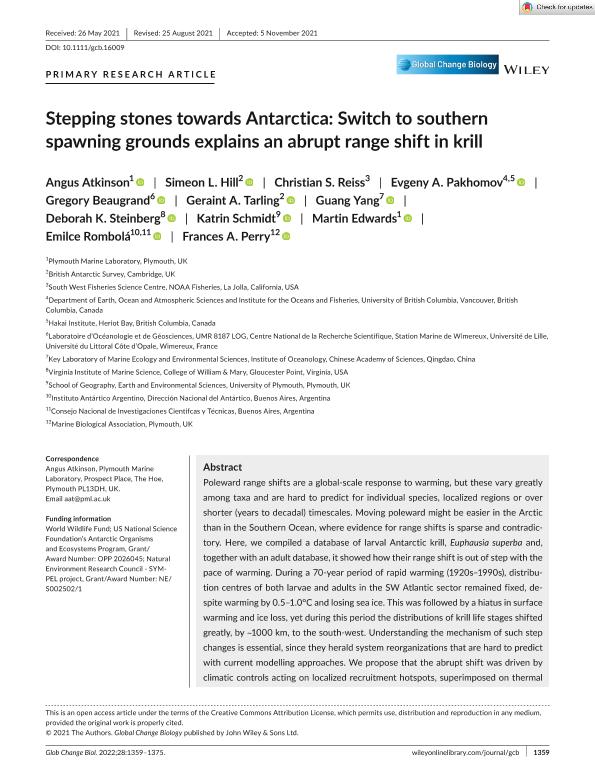Artículo
Stepping stones towards Antarctica: Switch to southern spawning grounds explains an abrupt range shift in krill
Atkinson, Angus; Hill, Simeon L.; Reiss, Christian S.; Pakhomov, Evgeny A.; Beaugrand, Gregory; Tarling, Geraint A.; Yang, Guang; Steinberg, Deborah K.; Schmidt, Katrin; Edwards, Martin; Rombola, Emilce Florencia ; Perry, Frances A.
; Perry, Frances A.
 ; Perry, Frances A.
; Perry, Frances A.
Fecha de publicación:
02/2022
Editorial:
Wiley Blackwell Publishing, Inc
Revista:
Global Change Biology
ISSN:
1354-1013
Idioma:
Inglés
Tipo de recurso:
Artículo publicado
Clasificación temática:
Resumen
Poleward range shifts are a global-scale response to warming, but these vary greatly among taxa and are hard to predict for individual species, localized regions or over shorter (years to decadal) timescales. Moving poleward might be easier in the Arctic than in the Southern Ocean, where evidence for range shifts is sparse and contradictory. Here, we compiled a database of larval Antarctic krill, Euphausia superba and, together with an adult database, it showed how their range shift is out of step with the pace of warming. During a 70-year period of rapid warming (1920s–1990s), distribution centres of both larvae and adults in the SW Atlantic sector remained fixed, despite warming by 0.5–1.0°C and losing sea ice. This was followed by a hiatus in surface warming and ice loss, yet during this period the distributions of krill life stages shifted greatly, by ~1000 km, to the south-west. Understanding the mechanism of such step changes is essential, since they herald system reorganizations that are hard to predict with current modelling approaches. We propose that the abrupt shift was driven by climatic controls acting on localized recruitment hotspots, superimposed on thermal niche conservatism. During the warming hiatus, the Southern Annular Mode index continued to become increasingly positive and, likely through reduced feeding success for larvae, this led to a precipitous decline in recruitment from the main reproduction hotspot along the southern Scotia Arc. This cut replenishment to the northern portion of the krill stock, as evidenced by declining density and swarm frequency. Concomitantly, a new, southern reproduction area developed after the 1990s, reinforcing the range shift despite the lack of surface warming. New spawning hotspots may provide the stepping stones needed for range shifts into polar regions, so planning of climate-ready marine protected areas should include these key areas of future habitat.
Archivos asociados
Licencia
Identificadores
Colecciones
Articulos(SEDE CENTRAL)
Articulos de SEDE CENTRAL
Articulos de SEDE CENTRAL
Citación
Atkinson, Angus; Hill, Simeon L.; Reiss, Christian S.; Pakhomov, Evgeny A.; Beaugrand, Gregory; et al.; Stepping stones towards Antarctica: Switch to southern spawning grounds explains an abrupt range shift in krill; Wiley Blackwell Publishing, Inc; Global Change Biology; 28; 4; 2-2022; 1359-1375
Compartir
Altmétricas



